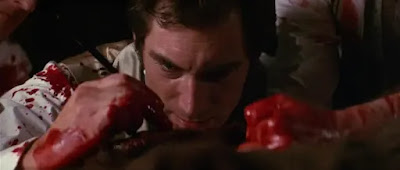The script was adapted by Ronald Harwood and the film directed by legendary British cinematographer Freddie Francis (The Innocents, The French Lieutenant's Woman, Glory, as well as The Elephant Man, Dune and The Straight Story for Lynch, and Cape Fear for Martin Scorsese).
One can't say anyone scrimped on the cast. For all the loathsomeness of the subject matter, it attracted a great crew of British thespians with Jonathan Pryce and Stephen Rea as the psuedonymed Robert Fallon and Timothy Broom, who would liquor their victims up and then suffocate them for the betterment of science. Their customer is Dr. Thomas Rock (Timothy Dalton, just before his Bond years), who in some twisted idealism, looks the other way at the subjects brought to him by Fallon and Broom. He is opposed, and looked on with suspicion, at the Institute by Professor Macklin (played by a pre-Trek Patrick Stewart) and supported there by Dr. Murray (Julian Sands) who has his own secrets—he is in love with a bar-doxie (Twiggy), who may become one of the potential victims.
Great cast, maybe, but great movie it is not, despite the pains taken to present the squalor of London, both upstairs and downstairs. After starting out as a cinematographer, Francis became a director, doing a lot of pictures for Britain's Hammer Studios, a good prep for his work on this. It is atmospheric, alright, with a low-level discomfiture throughout, with Fallon and Broom being the lowest of the low, preying on the sick, weak and debilitated, and Rock turning a blind eye to the source (grave-robbing at best) of his demonstration subjects.
There is a very large irony inherent in the script, not to far afield from the one Richard Matheson employed in "I Am Legend." But, the script, whatever it's pedigree (Harwood is an Oscar-winner, Dylan Thomas a writing legend) is the film's true down-fall. It might seem a bit leaning to the pedestrian to say this, but there is no one to root for in all this, no one to sympathize with—not even the victims—and one watches with a dis-interest in the outcomes...for anyone.
There might have been a real reason no one dug up this script for so long.





No comments:
Post a Comment